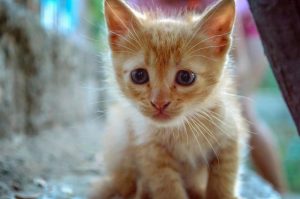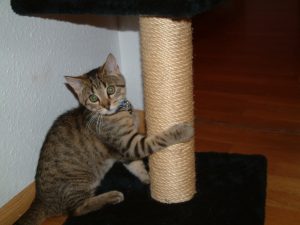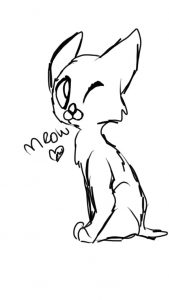Meow. A kitten’s meow is one of the cutest, most adorable sounds you will ever hear! Kittens meow for a number of different reasons. The purpose for meowing changes as kittens grow from being newborns to becoming older kittens.
Reasons Newborn Kittens Meow
Kittens can already meow at birth but newborn kittens that are healthy and content are generally silent. They meow only to tell their mother that they are either hungry, cold, alone or scared. Mother cats leave the nest from time to time to feed or use the litterbox and their kittens’ meow can always instinctively call them back. If in acute distress or pain, the newborn’s meow can be loud and shrill but most of the time it is a soft meow. Adult cats have a keen sense of hearing so mother cats can hear her kittens’ soft meow as long as she is within hearing range.
If a
newborn kitten is well-fed, warm and has her mother around but is still continuously meowing, there may be a medical reason so it is best to have the kitten checked by the veterinarian immediately.
Reasons Older Kittens Meow
After kittens are weaned, a mother cat does not respond as much to the kittens’ meows as she did when they were still newborns. Meows therefore have evolved as a way older kittens communicate with their new primary caregiver at this stage of their life, their human parents.
Among themselves, kittens and cats do not use meowing as the primary means of communication. They communicate mostly by facial expressions and body language cues like movement of the ears and positioning of the tail. Cats also use scent as a form of communication among themselves. They occasionally vocalize a hiss, yowl or growl at other cats as a stronger way to get a messages across like “leave me alone”.
Alas, humans are a little less bright in understanding these body language cues so kittens must use verbal means of communicating with their humans, hence they meow. There are a number of variations to the meow which represent different messages.
A soft or middle-pitched short meow is a greeting like “hello”. If you have a kitten who greets you when you arrive then you are lucky! Most cats just open their eyes a little to see who’s there and then promptly go back to sleep! Kittens also make these short meows when they’re lonely or hungry.

A high-pitched, loud and drawn out “meeeooowww” uttered in multiple times in succession is a demand for attention and a bit like nagging. This means kitten wants you to do something for her. She may want you to play with her, give her food or treats, or wants you to open the door for her so she can go out or come in. Kittens, just like children, learn how to “manipulate” their parent humans to get what they want using their meows and cries.
A worried or annoyed kitten will make a lower-pitched, long and drawn out meow. This is sort of a complaining meow – either food and water bowl has been empty for too long or the litterbox needs cleaning right now. This is also the sound of an anxious meow telling you that kitten may be stressed or confused. Kittens usually vocalize this type of meow when they have been left alone by themselves all day. A new kitten who is feeling scared or overwhelmed by the unfamiliar surrounding may also emit this type of meow.
A shrill high-pitched piercingly loud meow, either short or long and drawn-out, usually indicates a kitten in pain. But remember some kittens can be wily little creatures and use this frantic-sounding meow just to get human’s attention IMMEDIATELY even if they are not in any danger or pain. So this meow is sort of tricky.
One must also take into consideration that some kittens are just more naturally talkative than others. The relatively more “noisy” breeds include the Siamese and the Burmese. Kittens from this breed can be very needy and demanding of attention. They sometimes follow you all around and keep meowing loudly. This is not to discourage you from choosing these oriental breeds. In fact, kittens of these breeds can be very affectionate. This is just to give you advance fair warning that if you want a more laid-back, silent type of cat then these breeds may not be for you. A lot of cats have been given up or abandoned because they grew up to be not the cat their humans thought they wanted.
Any medical condition that causes physical and mental discomfort or pain to a kitten will result in excessive meowing too. Examples include difficulty in urinating, diarrhea and constipation. You will notice kitten making frequent trips to the litterbox, straining and meowing. A kitten showing these signs must be seen by the veterinarian immediately especially if there is poor appetite and listlessness. There are also some diseases that can make kittens either always hungry or thirsty. These are legitimate reasons for kittens to meow frequently.
If you have a female kitten, remember that some kittens can come into heat as early as 6 months old! The meows of a kitten coming into heat are very loud, long and drawn out. It may be due to the discomfort or confusion she feels or she wants to go out.
What To Do When Your Kitten Keeps Meowing
First make sure that kitten is not in distress or suffering from any illness. Do not ignore a meowing kitten unless you are absolutely sure there is nothing physically wrong with her. Do a nose to tail check first to look for any physical problems that may be causing pain or discomfort. If you can take kitten to the veterinarian’s office for a more thorough check-up, the better. Do this immediately if the kitten is constantly meowing and appears weak and sick.
If the veterinarian gives kitten a clean bill of health, make a regular feeding and play schedule and stick to it. Do not give in to excessive demands for food and attention outside of these set schedules.
Negative reinforcement may work in discouraging excessive meowing. Ignore kitten by walking away when she is being noisy and demanding. Reward with attention and a little treat when she is quiet. Do not physically punish or scold the kitten. This might only lead to other behavioral problems in the future like fear and aggression towards you.
To counter anxiety and boredom if you have to leave kitten alone all day, provide her with toys that are safe. Interactive toys that stimulate the kitten’s hunting instinct are excellent. A cat tree and puzzle feeder are good ideas too. A secure catio can give kitten the advantage of being happily “outdoor” but safe. A
Miaustore pet water fountain will make sure she stays hydrated.


 A high-pitched, loud and drawn out “meeeooowww” uttered in multiple times in succession is a demand for attention and a bit like nagging. This means kitten wants you to do something for her. She may want you to play with her, give her food or treats, or wants you to open the door for her so she can go out or come in. Kittens, just like children, learn how to “manipulate” their parent humans to get what they want using their meows and cries.
A worried or annoyed kitten will make a lower-pitched, long and drawn out meow. This is sort of a complaining meow – either food and water bowl has been empty for too long or the litterbox needs cleaning right now. This is also the sound of an anxious meow telling you that kitten may be stressed or confused. Kittens usually vocalize this type of meow when they have been left alone by themselves all day. A new kitten who is feeling scared or overwhelmed by the unfamiliar surrounding may also emit this type of meow.
A shrill high-pitched piercingly loud meow, either short or long and drawn-out, usually indicates a kitten in pain. But remember some kittens can be wily little creatures and use this frantic-sounding meow just to get human’s attention IMMEDIATELY even if they are not in any danger or pain. So this meow is sort of tricky.
One must also take into consideration that some kittens are just more naturally talkative than others. The relatively more “noisy” breeds include the Siamese and the Burmese. Kittens from this breed can be very needy and demanding of attention. They sometimes follow you all around and keep meowing loudly. This is not to discourage you from choosing these oriental breeds. In fact, kittens of these breeds can be very affectionate. This is just to give you advance fair warning that if you want a more laid-back, silent type of cat then these breeds may not be for you. A lot of cats have been given up or abandoned because they grew up to be not the cat their humans thought they wanted.
Any medical condition that causes physical and mental discomfort or pain to a kitten will result in excessive meowing too. Examples include difficulty in urinating, diarrhea and constipation. You will notice kitten making frequent trips to the litterbox, straining and meowing. A kitten showing these signs must be seen by the veterinarian immediately especially if there is poor appetite and listlessness. There are also some diseases that can make kittens either always hungry or thirsty. These are legitimate reasons for kittens to meow frequently.
If you have a female kitten, remember that some kittens can come into heat as early as 6 months old! The meows of a kitten coming into heat are very loud, long and drawn out. It may be due to the discomfort or confusion she feels or she wants to go out.
A high-pitched, loud and drawn out “meeeooowww” uttered in multiple times in succession is a demand for attention and a bit like nagging. This means kitten wants you to do something for her. She may want you to play with her, give her food or treats, or wants you to open the door for her so she can go out or come in. Kittens, just like children, learn how to “manipulate” their parent humans to get what they want using their meows and cries.
A worried or annoyed kitten will make a lower-pitched, long and drawn out meow. This is sort of a complaining meow – either food and water bowl has been empty for too long or the litterbox needs cleaning right now. This is also the sound of an anxious meow telling you that kitten may be stressed or confused. Kittens usually vocalize this type of meow when they have been left alone by themselves all day. A new kitten who is feeling scared or overwhelmed by the unfamiliar surrounding may also emit this type of meow.
A shrill high-pitched piercingly loud meow, either short or long and drawn-out, usually indicates a kitten in pain. But remember some kittens can be wily little creatures and use this frantic-sounding meow just to get human’s attention IMMEDIATELY even if they are not in any danger or pain. So this meow is sort of tricky.
One must also take into consideration that some kittens are just more naturally talkative than others. The relatively more “noisy” breeds include the Siamese and the Burmese. Kittens from this breed can be very needy and demanding of attention. They sometimes follow you all around and keep meowing loudly. This is not to discourage you from choosing these oriental breeds. In fact, kittens of these breeds can be very affectionate. This is just to give you advance fair warning that if you want a more laid-back, silent type of cat then these breeds may not be for you. A lot of cats have been given up or abandoned because they grew up to be not the cat their humans thought they wanted.
Any medical condition that causes physical and mental discomfort or pain to a kitten will result in excessive meowing too. Examples include difficulty in urinating, diarrhea and constipation. You will notice kitten making frequent trips to the litterbox, straining and meowing. A kitten showing these signs must be seen by the veterinarian immediately especially if there is poor appetite and listlessness. There are also some diseases that can make kittens either always hungry or thirsty. These are legitimate reasons for kittens to meow frequently.
If you have a female kitten, remember that some kittens can come into heat as early as 6 months old! The meows of a kitten coming into heat are very loud, long and drawn out. It may be due to the discomfort or confusion she feels or she wants to go out.
